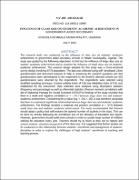| dc.contributor.author | Na’abu, Abubakar | |
| dc.date.accessioned | 2017-06-29T11:34:41Z | |
| dc.date.available | 2017-06-29T11:34:41Z | |
| dc.date.issued | 2015 | |
| dc.identifier.citation | Na’abu, A. (2015) Influence of Class Size on Students’ Academic Achievement in Government Aided Secondary Schools in Mbale Municipality, Uganda. Thesis (Masters). Islamic University in Ugandaa | en_US |
| dc.identifier.uri | http://hdl.handle.net/20.500.12309/305 | |
| dc.description.abstract | The research study was conducted on the influence of class size on students’ academic achievement in government aided secondary schools in Mbale municipality, Uganda. The study was guided by the following objectives: to find out the influence of large class size on student’ academic achievement and to examine the influence of small class size on students’ academic achievement. The research design adopted for this study was a Cross-sectional survey design involving 8778 population. The data was collected using self- developed Likert questionnaires and document analysis to help in answering the research questions and 542 questionnaires were administered to the respondent in the three(3) selected schools but 502 questionnaires were returned by the respondents. The respondents were selected using stratified sampling technique. Content validity index of 0.80 and reliability index of 0.81 was established for the instrument. Data collected were analysed using descriptive statistics (frequency and percentage) as well as inferential statistics (Pearson moment correlation) with aid of Statistical Package for Social Scientists (SPSS)The findings of the study revealed that there is a weak and negative correlation (r = -.331) between large class size and students’ academic achievement. Considering the p-value (sig. = .001 < .05), it was therefore concluded that there is a statistical significant relationship between large class size and students’ academic achievement. The findings revealed a moderate and positive correlation (r = .572) between small class size and students’ academic achievement. The study recommended that Schools should adopt a policy that will endorse the optimal number of students in the class. This can be done by strictly following the enrollment Act of the Ministry of Education and Sports. However, government should build more schools in order to contain large number of children seeking for education every year. Teachers should try as much as they can to capture and sustain students’ attention irrespective of the class size. It is suggested that further studies can be conducted on the relationship between students’ enrollment and management of students’ discipline in order to explore the challenges of high students’ enrollment in teaching and learning process. | en_US |
| dc.language.iso | en | en_US |
| dc.subject | Influence | en_US |
| dc.subject | Class Size | en_US |
| dc.subject | Academic Achievement | en_US |
| dc.subject | Government | en_US |
| dc.subject | Secondary schools | en_US |
| dc.subject | Uganda. | en_US |
| dc.title | Influence of Class Size on Students’ Academic Achievement in Government Aided Secondary Schools in Mbale Municipality, Uganda. | en_US |
| dc.type | Thesis | en_US |

